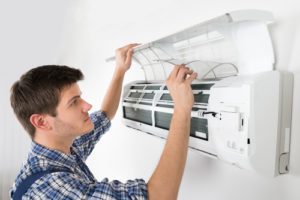So, you’ve been using your air conditioner to help you and the other inhabitants of your building beat the heat, and so far, things have been going pretty well. Today though, you walked into the room where your indoor unit is located and noticed something strange. There’s a pool of water on the floor near your indoor unit, and you aren’t sure what it means. “How about that,” you thought to yourself, “my air conditioner is leaking water.” Then the questions started. Is this a regular process that you’ve simply never noticed before, or is it the harbinger of an emergency that could cost you insane amounts of money to fix? Fortunately, you came to the right place for help.
 Leaking water is a common phenomenon amongst air conditioners, and it may mean several things. We’re here to help you identify the likely causes of any water you see leaking from your unit and tell you what you can do to stop it. Read on to learn what leaking water means for you, and prepare yourself accordingly. With our help, you’ll be able to prevent this occurrence from ruining your air conditioner or your peace of mind.
Leaking water is a common phenomenon amongst air conditioners, and it may mean several things. We’re here to help you identify the likely causes of any water you see leaking from your unit and tell you what you can do to stop it. Read on to learn what leaking water means for you, and prepare yourself accordingly. With our help, you’ll be able to prevent this occurrence from ruining your air conditioner or your peace of mind.
5 Reasons My Air Conditioner is Leaking Water
There are five common reasons that an air conditioner might have for leaking water. They run the gamut from simple to serious, and from inexpensive to costly. Each of these causes can be identified by distinct symptoms. They are as follows:
- Backup in the condensate drain line: your condensate drain collects moisture that forms on your evaporator coil, and removes it. If it becomes backed up for any reason, that moisture can overflow onto the area surrounding your unit. Several different substances can clog the condensate drain in your air conditioner, including dust, dirt, and even mold. Condensate drain clogs are by far the most common reason for air conditioner water leaks. To check and see if your condensate drain is clogged, simply pull out the pan and have a look. If it is, you should be able to remove the clog yourself and go back to using your air conditioner normally.
- A broken drain pan: when you pull out your condensate drain pan to have a look at the line, inspect the pan too. If it has a hole in it from damage or rust, you might not even need to look at the drain line itself. Drain pans get old and they wear out, just like everything else. A hole in the drain pan means that water just falls through onto the floor, so you’ll have to buy a new one if this occurs.
- Old or dirty air filters: many people don’t realize how easy it is to change the air filters on their system by themselves—or how necessary. However, letting your filters get dirty can have serious consequences, like blocking air from reaching the evaporator coil and making it freeze over. If this occurs, the resulting ice is likely to cause too much water for your pan to handle when it melts. Check your filters at least once a month to prevent this from happening, and replace them with fresh ones. It’s a lot cheaper than replacing your evaporator coil entirely.
- Low refrigerant levels: low refrigerant can be identified by a loss of cooling capabilities and the hissing that often accompanies a refrigerant leak. Low refrigerant reduces the pressure in your AC, and causes the evaporator coil to freeze just like a dirty filter. Unlike a dirty filter, however, refrigerant should only ever be replaced by a professional.
- Condensate pump malfunctioning: if you have an air conditioner with an indoor unit, the condensate pump will be responsible for moving the water produced by your evaporator coil to the outside of your home. When the pump breaks down, this process cannot occur, and the water leaks onto your floor. Unfortunately, the only real way to tell that this is happening is an absence of other symptoms. If you’ve checked everything else and you still can’t explain the leak, call a professional who can look at your condensate pump and tell you if it has a problem.
In most cases, leaking water is not a sign that disaster is about to strike. Still, it should be handled quickly before the water has a chance to become a slipping or electrical hazard, and before it can damage other components of your system. Handling the problem requires you to determine the cause. Your first thought after, “my air conditioner is leaking water” should always be, “why?” Learn to recognize the likely causes for leaking water near an air conditioner, and know which ones require professional assistance. Refer to this guide often, and you should always be able to deal with water near your air conditioner appropriately.
